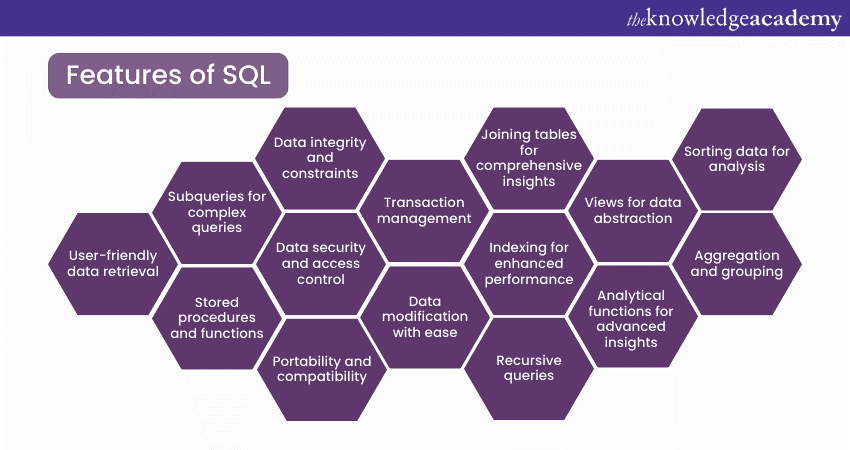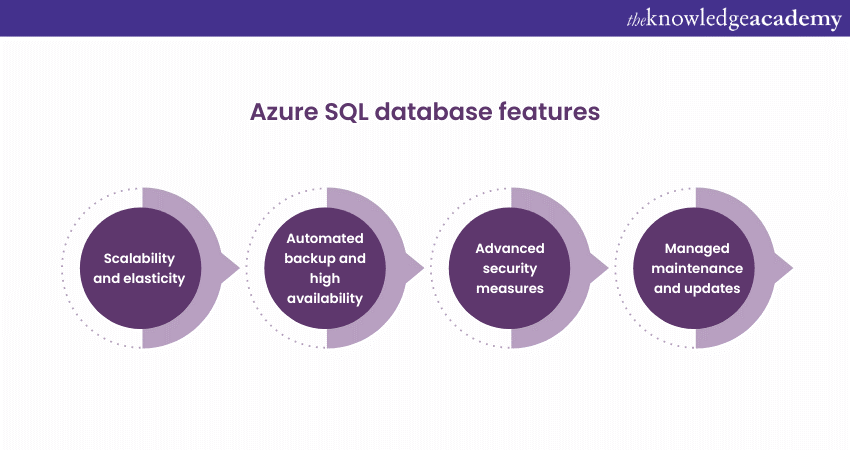We may not have the course you’re looking for. If you enquire or give us a call on +852 2592 5349 and speak to our training experts, we may still be able to help with your training requirements.
We ensure quality, budget-alignment, and timely delivery by our expert instructors.

Ever stared at a massive dataset, feeling overwhelmed by its complexity? SQL, the powerful language of databases, offers a lifeline. Advanced SQL Guide emphasizes that understanding the features of SQL is crucial for anyone looking to extract meaningful insights from data.
Whether you're a budding Data Analyst or a seasoned professional, this blog will illuminate the Features of SQL, from simple queries to complex manipulations. We'll explore the full spectrum of SQL's capabilities, empowering you to harness the power of your data.
Table of Contents
1) Features of SQL
a) User-friendly Data Retrieval
b) Data Modification with Ease
c) Data Integrity and Constraints
d) Joining Tables for Comprehensive Insights
e) Aggregation and Grouping
f) Sorting Data for Analysis
g) Subqueries for Complex Queries
h) Data Security and Access Control
i) Transaction Management
j) Indexing for Enhanced Performance
2) SQL Server Versions and Features
3) Azure SQL Database Features
4) Conclusion
Features of SQL
SQL (Structured Query Language) is a domain-specific language used for managing and manipulating relational databases. It offers several key features that make it a powerful tool for working with data:

User-friendly Data Retrieval
SQL provides a simple and intuitive syntax for querying databases. The SELECT statement is the core of data retrieval, allowing users to specify the desired columns and filtering conditions. Its flexibility extends to ordering, grouping, and aggregation, making complex data extraction a straightforward task.
Data Modification with Ease
SQL empowers users to modify data effortlessly. The INSERT, UPDATE, and DELETE SQL commands enable seamless data manipulation.This is especially crucial for maintaining the accuracy and currency of information within a database.
Begin your SQL journey with our Introduction to MySQL courseat The Knowledge Academy.
Data Integrity and Constraints
SQL's features go beyond basic data manipulation. It ensures data integrity through constraints like UNIQUE, NOT NULL, and CHECK, which are closely tied to the types of keys in SQL. These constraints enforce rules that prevent erroneous data from being stored in the database.
Joining Tables for Comprehensive Insights
The power of SQL truly shines when dealing with multiple tables. The JOIN operation allows users to combine data from different tables based on related columns. This feature is instrumental in generating comprehensive insights from complex datasets.
Aggregation and Grouping
SQL's ability to aggregate and group data facilitates the creation of summary reports and statistical analyses. The GROUP BY clause, coupled with aggregate functions like SUM, AVG, MAX, and MIN, enables users to condense vast amounts of data into meaningful summaries.
Sorting Data for Analysis
Sorting data is essential for meaningful analysis. When creating a database in SQL, SQL's ORDER BY clause arranges query results based on specified columns and sorting criteria. This feature assists in identifying trends and patterns within the data.
Subqueries for Complex Queries
SQL supports subqueries, enabling users to nest queries within queries. This capability is invaluable for solving complex problems by breaking them down into manageable steps. Subqueries can be used in various parts of a SQL statement, including the SELECT, FROM, and WHERE clauses.
Data Security and Access Control
Security is paramount when dealing with sensitive data. The Components of SQLServer include robust mechanisms for user authentication and access control. Database administrators can grant and restrict access rights, ensuring that only authorised personnel can access, modify, or delete data.
Transaction Management
SQL's transaction management features to maintain data integrity even in the face of unexpected errors. The BEGIN TRANSACTION, COMMIT, and ROLLBACK statements allow users to group multiple SQL operations into a single transaction. This ensures that either all changes within the transaction are applied or none at all, safeguarding the database's consistency.
Get a clear comparison of SQL vs. MySQL in our latest blog!
Indexing for Enhanced Performance
Large datasets can lead to slow query performance. SQL addresses this issue through indexing. Indexes are data structures that expedite data retrieval by creating a quick lookup path. By creating indexes on frequently queried columns, users can significantly enhance query performance.
Views for Data Abstraction
SQL introduces the concept of views, which provide a virtual representation of data stored in one or more tables. Views can simplify complex queries, offer a level of abstraction, and enhance data security by limiting the exposure of sensitive information. Additionally, understanding Inserting Data in SQL is crucial, as views can be created based on inserted data to streamline data management and retrieval.
Unleash the power of SSRS in our comprehensive SQL Server Reporting Services (SSRS) Masterclass course – sign up today!
Stored Procedures and Functions
SQL enables the creation of stored procedures and functions. These are pre-defined sets of SQL statements that can be executed as a single unit. They enhance efficiency by reducing the need to send multiple SQL queries to the server and can be reused across various applications.
Portability and Compatibility
SQL's standardised syntax ensures portability across different Relational Database Management Systems. While there might be variations in features and functions, the core SQL syntax remains consistent, allowing users to transfer their skills and queries across various database platforms.
Recursive Queries
SQL supports recursive queries, allowing users to query hierarchical data structures such as organizational charts and bills of materials. The WITH RECURSIVE clause facilitates this capability by enabling the creation of recursive Common Table Expressions (CTEs), simplifying the querying of complex relationships. When considering SQL vs MySQL, it's important to note that while both support recursive queries, MySQL may handle certain recursive structures differently, depending on the version and configuration.
Analytical Functions for Advanced Insights
SQL's analytical functions provide in-depth insights into data trends and patterns. Window functions, such as ROW_NUMBER, RANK, and LEAD, allow users to perform calculations across a specified window of rows. These functions are particularly useful for tasks like calculating running totals, ranking data, and identifying outliers.
Begin your SQL journey with our Introduction to MySQL Course – sign up now!
SQL Server Versions and Features
SQL Server, developed by Microsoft, has undergone numerous versions, each introducing new features and enhancements to address the evolving needs of data management. Exploring a SQL Server Reporting Services Guide can further help in understanding reporting and data visualisation improvements across different versions. Let's highlight some of the key SQL Server versions and their standout features:
SQL Server 2019: Big Data Integration and Performance Boosts
SQL Server 2019 brought impressive enhancements such as Big Data Clusters that allow seamless integration of SQL Server with Apache Spark and Hadoop. This enables users to process and analyse large datasets efficiently. Additionally, Intelligent Query Processing introduced in this version enhances query performance by optimising execution plans.
SQL Server 2017: Cross-platform Compatibility and Graph Data Processing
One of the most significant advancements was the ability to install SQL Server on Linux. This marked a pivotal shift towards cross-platform compatibility. SQL Server 2017 also introduced built-in graph database capabilities, allowing users to model and analyse complex relationships in data.
SQL Server 2016: Always Encrypted and JSON Support
Security was a prime focus in this release with the introduction of Always Encrypted, which ensures data remains encrypted even during processing. The inclusion of JSON supports streamlined handling of semi-structured data, aligning with the growing need for flexibility in data storage.
Azure SQL Database Features
Azure SQL Database, a cloud-based database service provided by Microsoft, offers several advantages over traditional SQL Server installations. Here are some notable features of Azure SQL Database:

Scalability and Elasticity
Azure SQL Database provides flexible scaling options, allowing you to adjust resources based on workload demands. This ensures optimal performance during peak usage times while avoiding over-provisioning during periods of low activity.
Automated Backup and High Availability
Azure SQL Database offers automated backups and geo-replication, ensuring data is protected and available even in the event of a disaster. This feature minimises downtime and data loss, which is critical for business continuity.
Advanced Security Measures
Azure SQL Database incorporates robust security features, including data encryption at rest and in transit, built-in threat detection, and vulnerability assessments. These measures bolster data protection and compliance.
Managed Maintenance and Updates
Azure SQL Database takes care of routine maintenance tasks, such as patching and updates, reducing the burden on database administrators. This allows teams to focus on developing applications rather than managing infrastructure.
Conclusion
SQL is a powerful and adaptable tool. Features of SQL, spanning from easy data retrieval to intricate queries, allow businesses to gain valuable insights. Understanding the Advantages of SQL is key to leveraging its full potential for data management and analysis. Preparing for SQL Interview Questions can further help professionals solidify their understanding of these features. As data grows exponentially, SQL remains vital for secure manipulation and analysis. It also aids professionals in understanding complexities and making informed decisions for success. Leveraging the Java SQL Package enhances SQL operations within Java applications, making it a crucial skill for developers.
Unlock the power of data with our comprehensive SQL Courses! From querying to Database Management, we've got you covered.
Frequently Asked Questions
What are SQL's Data Manipulation Capabilities?

SQL's data manipulation capabilities include querying (SELECT), inserting (INSERT), updating (UPDATE), and deleting (DELETE) data within a database. These operations allow users to retrieve, modify, and manage data effectively, supporting various data handling tasks.
What are SQL Indexes, and why are They Important?

SQL indexes are database objects that enhance the speed of data retrieval operations. They work by creating a sorted reference to table data, allowing faster searches and queries. Indexes improve performance, especially in large databases, but can increase storage and maintenance costs.
What are the Other Resources and Offers Provided by The Knowledge Academy?

The Knowledge Academy takes global learning to new heights, offering over 3,000 online courses across 490+ locations in 190+ countries. This expansive reach ensures accessibility and convenience for learners worldwide.
Alongside our diverse Online Course Catalogue, encompassing 19 major categories, we go the extra mile by providing a plethora of free educational Online Resources like News updates, Blogs, videos, webinars, and interview questions. Tailoring learning experiences further, professionals can maximise value with customisable Course Bundles of TKA.
What is The Knowledge Pass, and How Does it Work?

The Knowledge Academy’s Knowledge Pass, a prepaid voucher, adds another layer of flexibility, allowing course bookings over a 12-month period. Join us on a journey where education knows no bounds.
What are the Related Courses and Blogs Provided by The Knowledge Academy?

The Knowledge Academy offers various SQL Courses, including the Introduction to SQL Course, Advanced SQL Training and the Introduction to MySQL Course. These courses cater to different skill levels, providing comprehensive insights into SQL Functions
Our Programming and DevOps Blogs cover a range of topics related to SQL, offering valuable resources, best practices, and industry insights. Whether you are a beginner or looking to advance your SQL skills, The Knowledge Academy's diverse courses and informative blogs have got you covered.
Upcoming IT Security & Data Protection Resources Batches & Dates
Date
 Introduction to SQL
Introduction to SQL
Fri 23rd May 2025
Fri 18th Jul 2025
Fri 12th Sep 2025
Fri 14th Nov 2025
Fri 12th Dec 2025
Fri 13th Feb 2026
Fri 17th Apr 2026
Fri 5th Jun 2026
Fri 14th Aug 2026
Fri 23rd Oct 2026






 Top Rated Course
Top Rated Course



 If you wish to make any changes to your course, please
If you wish to make any changes to your course, please


